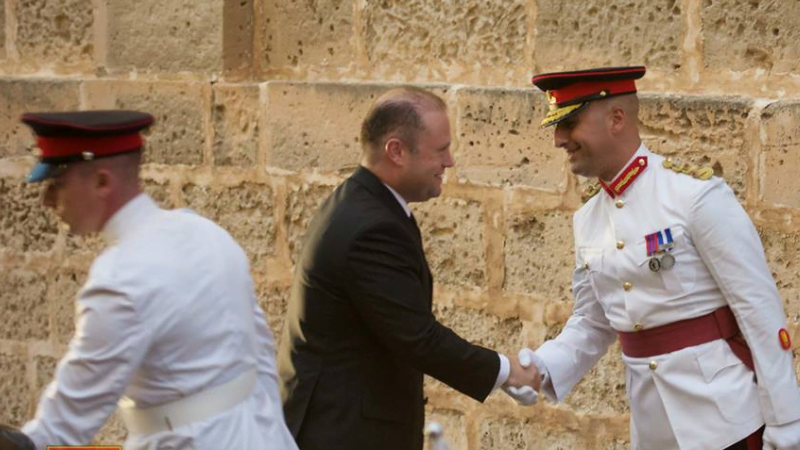The Ombudsman’s report confirming allegations that a massive number of promotions in the army all the way up to its highest ranks were intended to serve a political purpose as opposed to serving the interests of the nation, demands that political responsibility be shouldered.
The Ombudsman’s Office is one of the last remaining independent institutions that still enjoys the public’s respect for its integrity and objectivity. The government’s response was to say that it disagreed with the majority of the findings in the scathing report published on Friday showing that the surge in army promotions that were “not based on merit” were intended to favour the Labour Party over the nation’s security.
This is the same government that did all it could to block the investigation on what happened after the 2013 elections. It helped make sure that the same thing happened in the 2017 elections when half of the army was promoted in a 33-day period.
Only days before the snap election called by Joseph Muscat in 2017, Daphne Caruana Galizia had also published a number of reports on a sudden rush of promotions throughout the AFM.
The Ombudsman’s report did not mince words: “It was a process tailor-made to achieve a pre-ordained result. As such it improperly discriminated in favour of the chosen applicants. It also improperly discriminated against the complainants and indeed against all other eligible candidates in so far as they were not allowed to compete on an equal, level playing field with the chosen candidates.”
The report shows that soon after being elected, the Labour Party eliminated the previous system on which promotions in the army were based. Written tests and interviews that formed a part of the promotion process were done away with and the Ombudsman’s report notes that the process was then conducted in an “unprofessional manner”.
Among a number of other issues identified, the report notes that four of the five members of the selection advisory board did not have any military knowledge, and two – Ramona Attard and Clint Cutajar, who also occupied positions of trust – were nothing more than political appointees.
Attard is now a spokesperson for the Office of the Prime Minister. She has regular programmes on the Labour Party’s TV channel where she hosts one-sided ‘political’ debates that push the government line.
Cutajar has also moved on to greener pastures as the Parliamentary Secretary for Agriculture, Fisheries and Animal Rights.
There is no doubt left after the Ombudsman’s report that the Armed Forces of Malta is operating with a “defective system” which gives way to a situation where improper discretion, a lack of transparency and maladministration prevails.
Jeffrey Curmi a close friend of the Prime Minister’s family, received four promotions in as many months, taking him to the topmost rank of the AFM – Brigadier.
Further observations included the promotion of a gunner to the rank of Lance Corporal purely because the individual was a person of trust in the Office of the Prime Minister, with the report recommending the promotion is withdrawn.
The Ombudsman opened an investigation into claims and complaints that promotions within the AFM were given on the basis of favour and loyalty to the Prime Minister and Labour Party, a few months after the 2013 election.
When the Ombudsman at the time, Joseph Said Pullicino, announced his intention to investigate the complaints made by an army officer, the former Home Affairs Minister Manuel Mallia had tried to obstruct it but his objections were overruled twice and the Ombudsman was allowed to continue with his work.
After five years of investigation by the previous Ombudsman Said Pullicino and the incumbent Anthony Mifsud, they came to the conclusion that a number of promotions after the PL assumed office were designed to “produce a desired outcome” and were not based on merit, or awarded after following proper procedures.
The current state of the AFM is one where “undue external influence” is seriously prejudicing the rules of due process within the Maltese military, according to the report.
In 2017, while the Ombudsman’s investigation on the 2013 elections still could not reach its conclusion because of government stalling, it transpired that another 885 promotions were given by the AFM between the date Muscat called the snap election and the day voters entered the booths.
Most of the promotions were backdated by as much as 20 years, including arrears – a move AFM officials had said was “unprecedented” in the history of the army and was put down to “political appeasement on the election eve” by AFM sources.
A letter from an army officer stated that army personnel were queuing outside of the Brigadier and Deputy Commander’s office right up until the day before the election, and he expressed concern that such “injustices” and “damage” would affect the army for years to come.
The Ombudsman has recommended a radical review of the promotion process to ensure that all candidates are assessed in a fair and just manner, without any outside interference or influence.
The Opposition called for political responsibility to be shouldered, saying the Ombudsman’s report confirmed the process of promotions in the AFM had been vitiated to serve the needs of the Labour Party.












